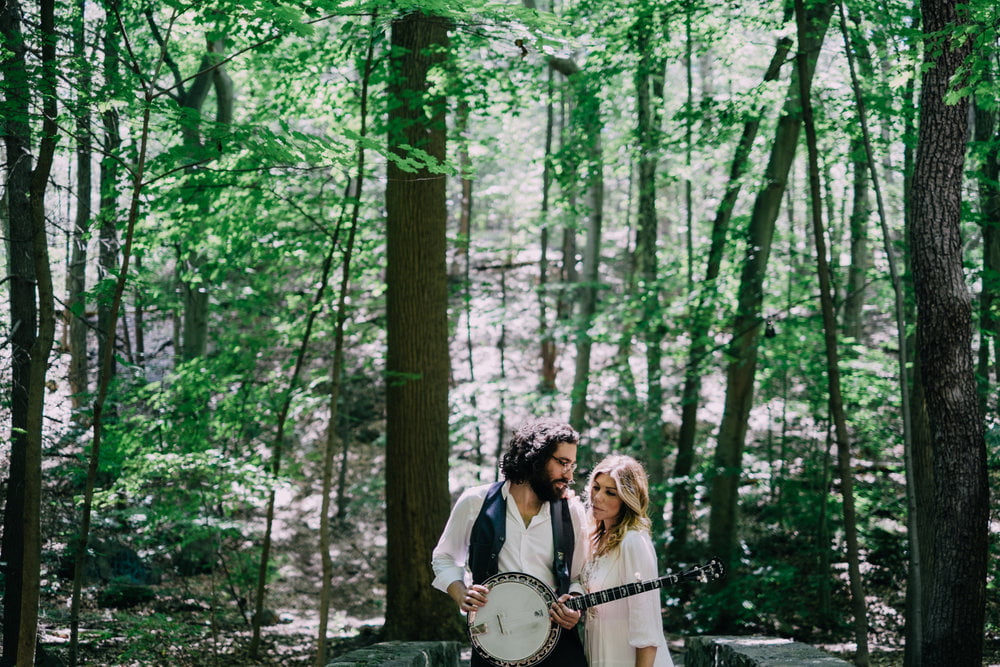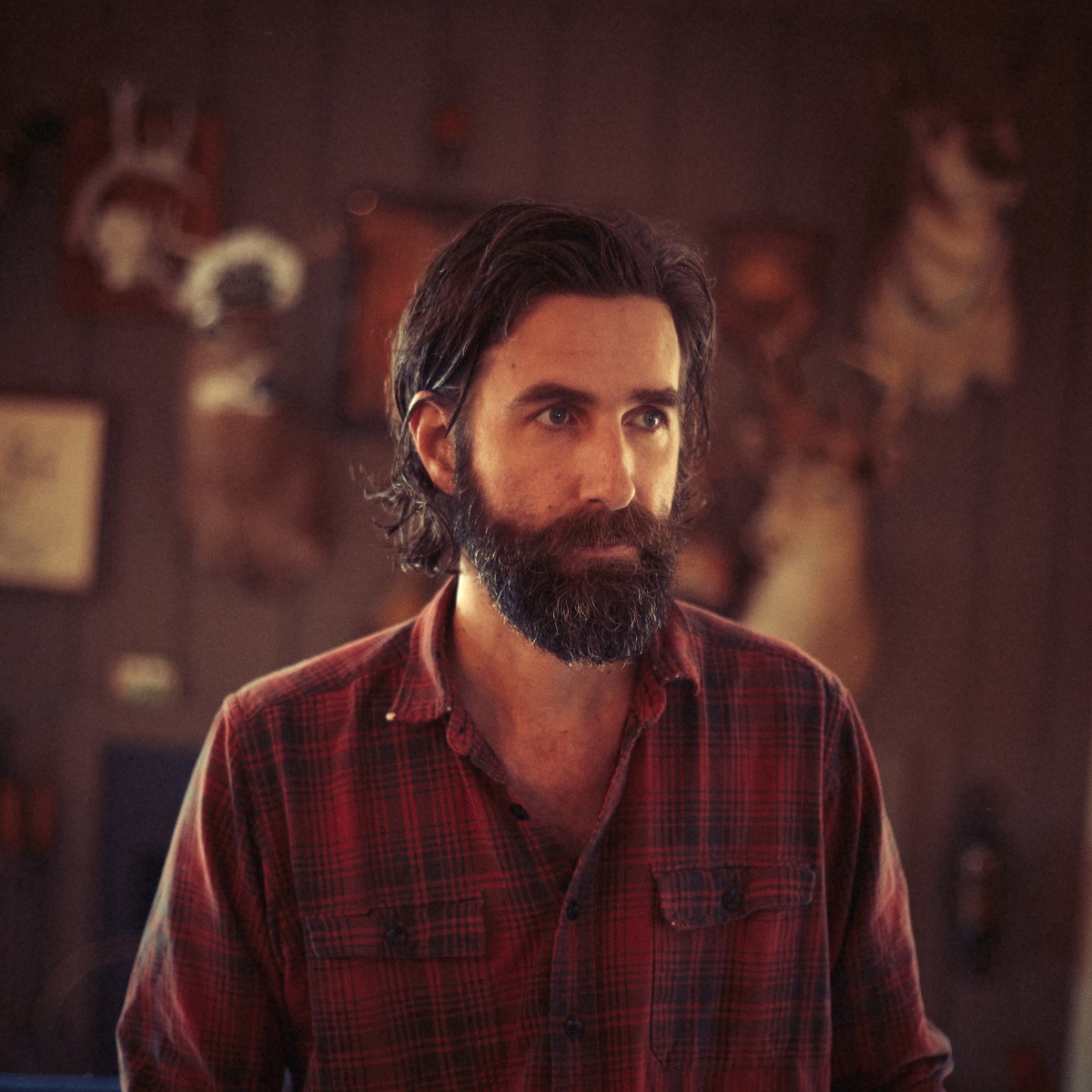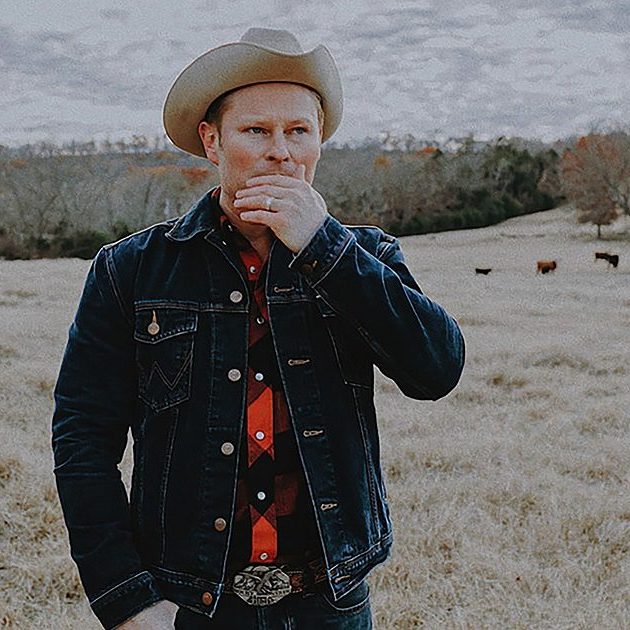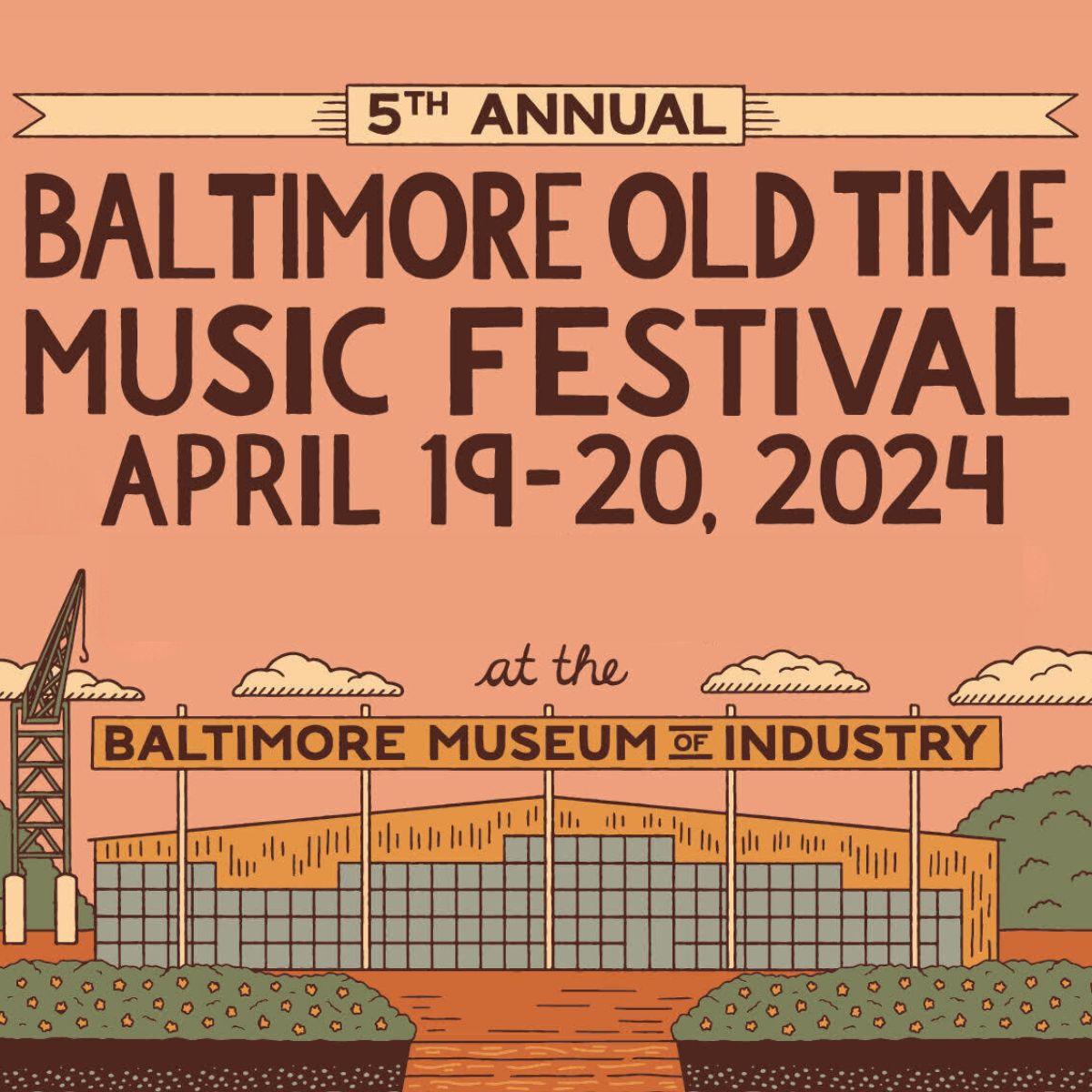In bluegrass, rags-to-riches stories are revered and glamorized, strong personal convictions are lauded, off-stage legends of wit and badassery are currency, and a sharp suit (rhinestones optional) and western hat speak volumes. There’s a notable correlation between the success of the genre’s greats and the presence of their personalities, perspectives, and stories throughout their art. The relatability, accessibility, and appeal of their songs can often be attributed not only to the level of talent, but also to the boldness with which their true selves are communicated, musically, to an audience. Roots music fans have always been hungry for indicators of an artist’s authenticity — a way to winnow out the performative, commercial aspects intrinsic to the recording industry and leave just the juiciest nuggets of “real life.”
Attempting to follow in that tradition and feed that hunger is Nefesh Mountain. Partners Eric Lindberg and Doni Zasloff want nothing more than to have the lens of their entire identities filtered through their brand of crisp, refined, and timeless bluegrass in myriad ways — tangible or intangible. Overtly, we hear this perspective in vocals sung in Hebrew, lyrical hooks derived from Jewish sayings, and a grassy cover of Irving Berlin’s “Russian Lullaby.” Deeper, more subliminally, we find that the themes of family bonds, a love for home, a respect for nature, and prayers for peace and empathy comforting our ears also stem from their Jewish background. But the specificity of this origin point is neither alienating or confusing. Rather, it reinforces two truths about this music: Bluegrass is for everyone, and bluegrass is indeed better when the people who make it shine brightly throughout it.
So many different folks from so many different backgrounds have analogous stories of how they come into roots music. What is it about bluegrass, old-time, and these more vernacular forms of roots music that allows the heart and soul of the music to effortlessly intertwine and weave itself into any background, experience, or personal story?
Eric Lindberg: That’s such a good question and something I think about all the time. I think that folk music — you could use “folk” or “roots music” — is synonymous with bluegrass nowadays. It’s all under that same umbrella. When I hear folk music from anywhere, it seems to be the music that translates in a spiritual sense or, for some people, a religious sense — which isn’t exactly where we’re coming from — or, as a general function of society, as a storytelling vehicle.
When I see and hear music from China, or Eastern Europe, or Australia, or Ireland, there’s kind of a pentatonic or maybe diatonic, very simple matrix of melody that has that high lonesome sound. There’s a certain thing about bluegrass that feels American to me; it connects me to our country. The way that the melody lilts connects me to the mountains, to the trees, and the things that I feel are undeniably true in the world. It speaks to my soul, as a human being.
As we’ve played our music infused with our Jewish background through the years, Doni and I have gotten in touch with our own hearts and our own worlds, breaking down the barriers between anybody or anything. It’s been really exciting to live this way — where we’re all humans. We’re living, breathing things, and we all just want … well, we don’t all, unfortunately, but the people that I know just want to put more love out there. Most of humanity is good, in that sense. Folk music has a way of bringing that out, and bluegrass, specifically, has this way of embracing nature, the beauties of the world, and also the beauties of humanity: feelings, friendship, love.
On your record, those themes might be assumed to be simply, overtly Jewish, but they do fit uncannily within the working language of bluegrass. The parallels are there. I wonder if you feel audiences relate to your music because they already feel these parallels, perhaps not from a cultural Jewish background, but from their own perspectives. Are you seeing that connection happen?
Doni Zasloff: That’s exactly what is happening, and it brings us almost to tears because it’s so moving. After a show, we’ll go into the audience, and it’s so many people of so many different backgrounds. That’s what’s happening with this music, and I don’t even have words to express the gratitude that I feel that it could do that.
Yes, the point is that we’re singing about love. We’re singing about friendship. We’re singing about these universal themes. That’s why we’re singing about them. The little bit of Hebrew in it is our background — it’s so cool to listen to music with different languages threaded into it. It’s a cultural expression.
EL: When we sing Hebrew, we’re celebrating our culture and our heritage. I was talking with Jerry Douglas, during the [recording] sessions, about the Transatlantic Sessions that he’s been leading and a part of for so long, and about how much that’s influenced me. The Scottish-Irish music they create is sung in these ancient kind of Scottish/Gaelic tongues, and it’s never been a barrier to me. I listen to that on repeat.
DZ: To your point, the message is something that we know all people can relate to. On one of the songs, “The Narrow Bridge,” we sing an old saying from the 1800s: “The whole world is a narrow bridge, and the important thing is to not be afraid.” We thought it was a beautiful, poetic saying. We turned it into a story and a song relating to the world right now and how it feels troubled and divided.
I love the lyric in that song, “From the cracks of a barren land, a beauty grows unplanned.” I feel like that’s what roots music is poised to accomplish, especially when it’s dedicated to the idea that we can come from different backgrounds, experience life, and be human with empathy and understanding for stories and experiences that might seem ultra-specific and somewhat forbidding. Have you tried to make what you do more relatable for that purpose? Or does it just work if you put it out into the universe as is?
EL: I think, on the one hand, it works if you just put it out into the universe, but we’re really careful what we put out. Well, not careful, but we really want to write songs that are universal. I think that’s something about folk music — it is universal. It goes back to that thought that we’re all people. There are certain things that we can all embrace and rejoice in about life, in general, while also coming at it from our own different places and different flavors. Like food, it’s a universal thing, but sometimes I want sushi and sometimes I want Mexican. We all have cultures — and beautiful cultures — but they’re better all celebrated in the mix together.
DZ: The magic of bluegrass and old-time music, for us, is that it’s been a way to break down some people’s perceptions. We’re Jewish Americans. This is who we are. I’ve lived here all my life. My mother lived here all her life, and my grandmother came from Poland. I think to be doing “Jewish bluegrass,” we’re quite literally being authentic to what we know and who we are. A lot of people will immediately try to stereotype Jewish music as klezmer music, even when say we play this music they’ll say, “Oh, are you like, klezmer-y?” No! We’re not. Yes, my great-grandmother lived in Poland, but I don’t, so that’s not authentic to me.
You’re making melting-pot music.
DZ: Right. And this is who I am.
EL: Jewish people are an interesting bunch of folks. Throughout all the years of this world, Jewish people have lived in all these places of the world: Eastern Europe, Spanish-speaking countries, South America — we’ve kind of moved all over the place. Historically, we’ve made music in all these different places where Jews have put down roots. In Eastern Europe, what we know as the branded Jewish music is klezmer and that’s because that’s where they lived! Klezmer is actually more of an Eastern European sound than a Jewish sound. For me, it’s interesting that Jewish people have lived in this country for centuries, but we haven’t played these American forms.
I want to shift gears a little bit. In my experience, being gay in bluegrass, if I boil my identity down to just those two communities, I find myself on the margins of both. Gays don’t know what to do with a gay who plays banjo, and bluegrass doesn’t know what to do with a gay who plays banjo. So I wondered … you exist in a very small overlap of the Venn diagram of Jewish identities and bluegrass. Do you feel the tension of being on the fringes of both of those communities?
EL: I do. I totally do. Hearing you talk about it makes me feel for you, because I live in a world — in my own head, and I want the world to be this way — where there are no barriers or lines between people. I was born in Brooklyn to be this Jewish American kid who happened to fall in love with bluegrass music. A lot of that was because my father actually converted to Judaism before I was born. My dad’s side of the family, who aren’t Jewish, all used to live in rural Georgia, and we’d go down there for weeks at a time, when I was a kid, being in the heartland, in Appalachia. With the make-up of who I am — whether it’s my experiences, where I was born, or the kind of melodies that I like — I can’t help but be a Jewish bluegrass musician. That’s just the truth. I think the world’s going to have to catch up to that. Just like you have to blaze your trail — which you are doing — Doni and I have to create, for lack of a better word, a genre around this music, because there’s no textbook for it.
That’s interesting, because in bluegrass, Jewish folks are one of very few marginalized, minority identities that actually have had ongoing, historical representation. From folks like Ralph Rinzler to Andy Statman to Jerry Wicentowski — how do you feel your music connects to that Jewish heritage within bluegrass? Or does it at all?
EL: I love Andy Statman. He’s a master klezmer musician and, obviously, a master on the mandolin. He changed the mandolin game around when Tony Trischka was changing the banjo game back in the ‘70s or earlier. Béla Fleck, by his heritage, is Jewish. Noam Pikelny is Jewish — and I’m not trying to out them in any way — and David Grisman. I mean, I’ve had so many heroes in the bluegrass world and whether they were Jewish or not has had no bearing on that. I’ve always found it interesting, actually, that so many Jews could record gospel music. I’ve always wondered about it with my big heroes. Like David Grisman … how did that work for him?
I think that, over the years, and especially since World War II, Jews in this country have been very silent about who they are, whether or not they’re religious with their Judaism, or just culturally. The biggest case, I think, is Bob Dylan who, in the end, converted away from Judaism, but who is obviously the biggest troubadour and songwriter of our time. He grew up as a Jew in the Midwest. When he moved to New York, he basically copied Woody Guthrie, a very non-Jewish persona. Jews have a hard time dealing with the events of World War II. I don’t have it totally worked out, but there’s something in there.
DZ: And I think that people with Jewish identities have been comfortable being the comedians, and it’s different for a Jewish person to come out and be very authentic. There has been some Jewish bluegrass in the past, but it has all been kind of comedic and not quite the same as us coming from a really soulful place, trying to speak to who we are, own it, share it, and take a different approach.
To get back to this prior question: Do you feel like you have looked to that representation of other people with Jewish identities in bluegrass as an influence? Does your music build on it and expound on it, or do you feel like you’re coming from a different place? A different artistic impetus?
EL: I feel the latter. We’re coming from a different place. I was really only influenced by Andy Statman, personally, and it wasn’t in a Jewish way. I have listened to his klezmer music, but that hasn’t had any effect on my own bluegrass music.
I guess I just wanted to feel out if you thought you were on the same family tree as that tradition, or if you felt you two had planted your own sapling. It sounds like you feel like you have your own sapling growing, which is not a qualitative judgement. I’m not saying you should be one or the other.
DZ: I think that we are just deeply inspired by music. All of our heroes, you know, that’s where the inspiration came. We are just trying to be authentic to the expression of the music that we are so inspired by — like Béla Fleck, and all of the guys on the record. We just make honest music and we’re super inspired by other people who do that.
EL: To sum it up, we didn’t set out to be the first ones, but it kind of weirdly happened this way for us. Nobody has ever recorded any sort of spiritual or Jewish heritage [influenced] bluegrass music of their own making. Either I haven’t heard it, it’s been infused with some sort of klezmer, or it’s been something like a Jew doing a cover of a bluegrass song or a song with Bill Monroe. There have been so many beautiful bluegrass songs that I’ve played through the years — all the Bill Monroe, the Flatt & Scruggs, the Stanley Brothers, all the way through Tony Rice, Jerry Douglas, and Béla. I feel like I’m standing more on their shoulders, in terms of the music. I feel like we’re a separate thing.
DZ: Our story is that we fell in love when we were doing this — it’s our love story. It came from falling in love and being vulnerable. We always say this is our baby, this is our life. It came so much from inside of us. We had no plan. We were just falling in love and being authentic with each other. It just happened.



